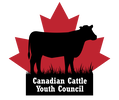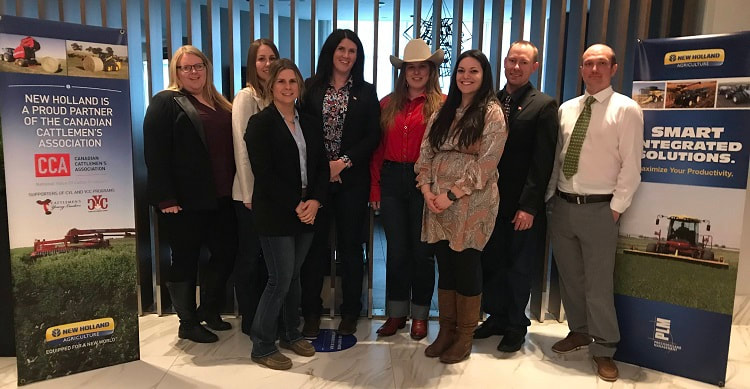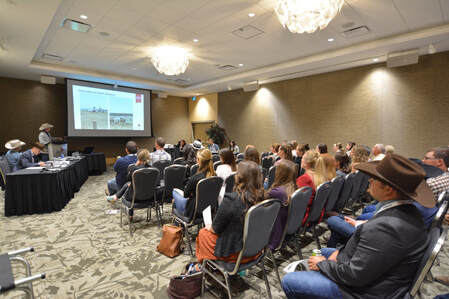|
The Young Cattlemen’s Council (YCC) is looking for young people passionate about the success of the Canadian beef industry! The YCC is now collecting nominations for two positions for young people to put their name forward for:
New this year is the Canadian Beef Check-Off Agency Youth Member- a brand-new position encouraging mentorship and connection with the next generation of Canadian beef producers and industry stakeholders. To be considered for either of these positions, please download and complete the nomination form (attached at the bottom of this post) and submit them alongside the additional requirements outlined in the documents by July 6, 2022, to [email protected]. **You can only put your name forward for the YCC Member at Large Position OR the Canadian Beef Check-Off Agency Youth Member position, not both** Please also note, it is expected the selected Check-Off Agency Youth Member will attend the Canadian Beef Industry Conference (CBIC) in Penticton, BC in-person to participate in the Check-Off Agency Annual General Meeting (AGM) and YCC AGM on August 16, 2022. (More details in nomination form) After the nomination deadlines, the YCC Member at Large submissions will be circulated with YCC Membership to vote virtually in the weeks ahead of the YCC AGM on August 16, 2022. The results will be announced at the YCC AGM. Options are being explored for YCC members and nominees to join the meeting virtually or call in. For the Check-Off Agency Youth Member position, YCC Delegates will vote shortly after the submission deadline on who’s name they will put forward to the Agency board. The successful candidate will be notified mid-July to arrange travel to CBIC. The YCC and Canadian Beef Check-Off Agency will be holding their AGMs at CBIC on August 16, 2022. If you would like to learn more, please go to “Join the Council” on our website, or direct your questions to [email protected]. More details can be found in the nomination forms below. *Please note that the nomination forms should be downloaded on your computer, as they may not be accessible on all mobile devices. If you have any questions or concerns, please contact [email protected].
0 Comments
4/28/2022 0 Comments 2022 CCA AGM: Domestic Ag reportThe Domestic Ag Policy and Regulations Committee has been very busy on many fronts.
The major topics that were discussed were in the BRM (Business Risk Management) portfolio.
Another major topic which is very important to the overall beef industry in our country are Forage insurance programs. At the moment there are three forage insurance projects underway that would use satellite imagery.
These three projects focus on native and tame pastures. It is unclear at this time how hay crops can be addressed. However, an important step has been made in the fact the feasibility of using satellite based imagery in enabling farm/ranch specific forage insurance has been established. The Animal Health and Care Committee met in Calgary in August 2021 at the Canadian Cattlemen's Association (CCA) semi-annual meeting and I have highlighted a few topics of interest from the meeting.
Priority Cattle Health Needs: The Canadian Animal Health Institute (CAHI) presented on the challenges of market access to veterinary medical health products in Canada. CAHI has reached out to the national species-specific veterinary associations and commodity and producer associations. CAHI will also collect input on barriers to bringing products to Canada from livestock industry organizations. They will work with regulators to lobby for improved processes to bring products to, and maintain products on, the Canadian market. Ultra High Frequency (UHF) RFID Adoption Strategy: CCA representatives, along with representatives from National Cattle Feeders' Association (NCFA) and Canadian Cattle Identification Agency (CCIA), met with the Canadian Food Inspection Agency (CFIA) and Agriculture and Agri-Food Canada (AAFC) staff to discuss adoption pathways for UHF technology. What is being proposed is UHF tags are sold through the CCIA online store, which will ensure numbering sequencing is managed and tags can be allocated to producers’ accounts. The UHF tags would then be crossed referenced to the existing LF tag and reported to CCIA. From this point on in the production value-chain of the animal, the UHF tag could be read, and movement events reported to CCIA. CCIA has drafted a funding proposal to make the necessary modifications to the CCIA – CLTS database to accommodate UHF tags. There was strong support for UHF in the US, and it’s the preferred path for animal ID. One of the challenges identified is to provide clear messaging to the tag manufacturers that there is a market for UHF tags and to encourage the research and development of UHF tags. There is growing demand for UHF tags, especially at the feedlot level, where the tag is being used as a replacement to the standard feedlot panel tag. Electronic Logging Devices Rick Wright from the Livestock Markets Association of Canada (LMAC) provided an update on challenges auction markets are facing regarding cattle transportation. Transporters mentioned issues with new Commercial Vehicle Drivers Hours of Service Regulations, which mandate the use of Electronic Logging Devices for commercial livestock haulers. The lack of flexibility under the hours of service (HOS) rules are problematic when dealing with emergencies and poor driving conditions. More flexibility is the key to ensure animal welfare can be upheld. Canada also lacks several exemptions that are available to US livestock haulers including the 150-air mile exemption from the departure point of transport. This summer, the US livestock industry lobbied for an additional 150 air-mile radius exemption under HOS regulations to the backend of hauls, which was eventually added under the Surface Transportation Act of 2021. This legislation still needs to be passed by US Senate. The Food Policy committee met on August 17, 2021 during the Canadian Cattlemen's Association (CCA) semi-annual meeting. With the CCA’s semi-annual meeting taking place during the federal election, the Food Policy Committee was unable to have the Government of Canada Officials from AAFC come to speak to their current priorities around Food Policy. However, CCA staff Jennifer Babcock was able to give a brief update on current issues such as the front of package labeling on ground beef, which has had limited progression since the beginning of COVID-19 in March of 2020. With that being said, CCA is still working to ensure that ground beef is exempt from this front package warning label to ensure that it does not persuade from buying a healthy, nutritious product. Canada Beef was also present during the meeting and gave a quick update on some of the initiatives that they are running around generic beef. Their current campaign focuses on the nutritional benefits of beef, and they are working through various partnerships, social media, and traditional media convey their message. Following the Canada Beef update, the Public and Stakeholder Engagement (PSE) team gave their update on the current files that they are working on. After the positive reception of Guardians of the Grasslands, the PSE team has now turned their attention towards the impact of feedlots and how they play an important environmental role by addressing the food loss/waste issue. The PSE team is also working hard to get quality data from third-party resources on the way the general public views the cattle industry to help them shape future campaigns. Finally, CCA staff gave a quick update on what the organization has been working on since March 2021. The first food policy committee fly-in was focused on building relationships with CFIA, Health Canada, and AAFC, as there are multiple issues to be worked on with each organization. As noted earlier, the front-of-pack labeling is still a priority issue for CCA, and the decision should come post-election, and it might differ depending on the result of the election. Lastly, CFIA released a “What we Heard” document on the Simulated Meat Guideline consultation conducted last fall. Some concerns arose out of the document as the consultation respondents were skewed towards consumers that only eat plant-based proteins. CCA’s Food Policy Committee continues to work will all industry partners to monitor and respond to any food policy issues as they arise. - Evan Chaffe, YCC Ontario Delegate
The Domestic Agriculture Committee met during the Canadian Cattlemen's Association's (CCA) semi-annual meeting both virtually and in person in Calgary, AB on August 19, 2021. A few highlights from the meeting include:
AgriRecovery Relief Measures for Drought and Wildfires: Francesco Del Bianco and Scott Pellow from Agriculture and Agri Food Canada’s (AAFC) BRM directorate provided the committee with an update on the recent AgriRecovery initiatives for drought and wildfire conditions. AAFC has also engaged with the Department of Finance on CCA’s request to enhance the Livestock Tax Deferral. Under AgriRecovery, the government of Canada increased the total AgriRecovery funding to up to $500 million to address extraordinary costs faced by producers due to drought and wildfires. The initial funding included $100 million announced on August 6, 2021, using a 60/40 cost share basis, as outlined in the Canadian Agricultural Partnership. The Government of Alberta is adding $136 million in provincial funding. Federal contribution will be an additional $203 million for a total of $339 million. Alberta is planning to provide $94 per head payment for breeding animals, with the additional $106 payment to be made through the federal portion. The Government of Manitoba announced $62 million in provincial funding for programs being developed to assist with feed assistance, feed transportation, cattle transportation, and herd rebuilding. They are expecting $93 million in federal funding for a total of $155 million. The Government of Saskatchewan announced $119 million in provincial funding, the federal government will contribute an additional $178 million for a total of $297 million. Similar to Alberta, the program intends to provide a $200 per head payment to help maintain breeding stock. The initial payment will be $100 per head and the next payment will be later in the fiscal year after confirmation of maintained breeding stock. The Government of Ontario has announced $5 million in provincial funding for drought relief, and the federal government will contribute $7.5 million for a total amount of $12.5 million. Similar to other provinces, the program will cover costs for purchasing feed, transportation of feed and water, transportation of animals, temporary fencing and other extraordinary costs related to the drought. These estimated costs will also be approximately $200 per head of cattle. The Government of BC has announced the province and federal government are working on an AgriRecovery program to help deal with the drought and wildfire challenges. Total funds have not yet been announced. Program details are expected to be similar to the AgriRecovery Wildfire initiative in 2017-2018. Since the meeting in August, the BC Government has announced a 60/40 cost share with the federal government. $20 million has been budgeted to help ranchers with extraordinary expenses for feed, shelter, animal health and safety, and livestock transportation as a result of wildfires and drought. The committee has emphasized to AAFC that the program needs to be straightforward for producers to access the relief funds and ensure the eligibility details are applied broadly as possible to demonstrate extraordinary costs. Business Risk Management under the Next Policy Framework: Co-Chair Rob Lipsett presented CCA’s BRM priorities under the Next Policy Framework (NPF), including recommendations on Livestock Price Insurance, AgriStability, AgriRecovery, the Livestock Tax-Deferral, AgriInsurance and Advance Payments Program. AAFC Representatives spoke to the committee on business risk management considerations for the NPF from Federal Government perspective. The Young Cattlemen's Council has also been working on a submission for the NPF on behalf of our members. These submissions will be sent to the federal government in mid-September. Livestock Price Insurance: An Update was provided by Brenna Grant from Canfax Research Services of progress on the Eastern Settlement Index Project. Key takeaways are the volumes for the calf index is good, the feeder index is sufficient but could use more volumes, and it was recommended that a couple more Ontario auction markets participate in providing data before launching the product. Similar methodology is used to calculate the calf and feeder indexes and are similar to the ones used in the West. Amy Higgins of the Maritime Beef Council updated the committee that the Maritime Beef Council has received conditional approval for their federal AgriRisk application to build administrative capacity for and Eastern price insurance program. Remote Sensing Pasture Insurance Project Update: Rick McConnell provided the committee an update on the CCA’s satellite-imaging project. The project titled “Remote Sensing Applications to Insure Individual Farm Forage Production” is funded under the Canadian Agricultural Partnership’s AgriRisk Initiatives. This is an extension of the feasibility study that CCA sponsored under Growing Forward 2. The project is intended to develop mathematical algorithms to estimate forage productivity for native, tame and hay pasture at the individual farm and ranch level across Canada. CCA hopes this will lead to the creation of pasture and forage insurance programs at the individual operation level, through which producers can submit a claim if their own forages produce less than on average. Boxed Beef Price Reporting Update: CCA staff provided an update on the lack of boxed beef price reporting in Canada. Agriculture and Agri-Food Canada (AAFC) Animal Market Information Service stopped reporting box beef and by-product prices in March 2020 due to lack of participation by processors. In May 2021, a working group consisting of CCA, ACFA, NCFA, and Canfax convened to discuss challenges related to the lack of boxed beef reporting in Canada. The mandate of the group was to identify and define the specific issues and agree on targeted solutions to these issues for the Canadian industry to pursue. In June and July, CCA organized meetings with mid-sized packers to emphasize the importance of boxed beef and by-product price reporting, and advocate for their voluntary participation in the reporting. There was varying levels of interest, however, there were little to no formal commitments from the mid-sized packers to report voluntarily. The recommendation from the group was that the industry should now pursue requesting Statistics Canada to establish mandatory reporting of box beef and by product value prices. CCA staff has engaged with Statistics Canada. Nominations are now open! **Last Updated July 10, 2021: YCC AGM date and format revised on blog post and nomination form The Canadian Cattlemen's Association Young Cattlemen's Council (YCC) is looking for young people passionate about the success of the Canadian beef industry to put their name forward to serve on the YCC Board. To be consider for the one available two-year Member at Large position on the Council, please download and fill out the nomination form at the bottom of the blog post and submit it alongside the additional requirements outlined in the document. The deadline is August 6, 2021. The election will be conducted electronically this year in the days prior to the YCC AGM, where submissions will be voted on by the Young Cattlemen’s Council membership. The Council will be holding its Annual General Meeting (AGM) on August 17, 2021 in Calgary, AB. The YCC membership and nominees will be invited to join the meeting virtually. Election results for the two-year term Member at Large position will be announced at the AGM. If you know of any young people who may be interested, please feel free to share this information with them. For more information please visit our Join the Council page, or please direct any questions to [email protected]. **Please note, the nomination form can be downloaded on your computer, as it may not be accessible on all mobile devices. If you have any questions or concerns, please contact [email protected].
In March, I had the opportunity to attend to the Canadian Cattlemen’s Association’s (CCA) Animal Health and Care Committee annual meeting virtually on March 17, 2021. There were many topics discussed and I will highlight some of them that I think would be interesting to young producers.
First was the ongoing discussion of a vaccine bank in case of a foot and mount disease outbreak. At this point in time Canada does not have enough vaccines in the event of an emergency situation. CCA is strongly encouraging the government for a vaccine bank. An Ultra High Frequency tag trial at the Picture Butte Feeder Cooperation started in 2020. It is a trial put on by the feeder association for use in feedlots in a commercial environment. It will be expanded to five other locations in 2021 as well. There was also discussion from a trial participant and he was very positive about it so far. There’s a new rest stop facility near Kapiskasing ONT, called the Feed and Water Cow Mootel. This rest stop has been in operation since fall 2020 and currently has the capacity for 3-4 semi-trailers of feeder cattle, with ability to expand if demand is there. There was an update on Transport Canada’s changes to the Commercial Vehicle Drivers Hours of Service Regulations. These regulations come into effect in June 2021 and will mandate the use of Electronic Logging Devices for commercial livestock haulers. CCA has heard concerns from livestock truckers on these new regulations and have expressed these concerns to Transport Canada. Animal Health Emergency Management (AHEM) has developed producer handbooks and provincial association plans. AHEM is working closely with CCA to develop a National Emergency Response Framework. A working draft of the beef framework has been developed and next steps include a comprehensive test to help identify where gaps in the plan remain along with confirming strengths of the plan. The National Farm Animal Care Council continues to be active on a number of files including updating the Codes of Practice. Transportation is the focus with the recently released Humane Transportation Regulations. The CCA is also please to see that Canada is one step closer to attaining BSE negligible risk status. During the Animal Health and Care Committee meeting, CFIA National Coordinator BSE Program, Aman Bath, updated the committee on Canada’s BSE negligible risk application to the World Organisation for Animal Health (OIE). CFIA received notification earlier in March that Canada has received a recommendation by the OIE’s Scientific Commission to grant Canada the negligible status for BSE risk. The recommendation will then be put to a vote by the delegates at the 88th General Assembly at the end of May. Negligible risk status would help facilitate expanded access to foreign markets for various beef products currently limited by BSE era restrictions. The Canadian Cattlemen’s Association’s (CCA) Food Policy Committee has been very busy since the last report. The Committee has dealt with food labeling issues, building CCA's position on simulated meat products and the Canadian Food Inspection Agency (CFIA) consultation on simulated meat labeling guidelines.
At the start of December, the CFIA closed its consultation on simulated meat and poultry labeling guidelines. With the guidance of the Food Policy Committee, CCA’s Lauren Martin outlined a response to the proposed guidelines. The general context of CCA's submission was to maintain the position that no simulated meat products should ever have the chance to be mistaken for a traditional meat product. Thus, the submission outlined that our position was that simulated meat products should not be allowed to use terms such as sirloin, striploin or ribeye as these are traditional meat terms and have a high likelihood of confusing the consumer. Other points the submission outlined were not allowing companies to use images of animals of the meat they are trying to simulate. The misleading labeling of alternative proteins has been a concern of the Food Policy Committee because it may have the opportunity to mislead consumers in-store. Thus, CCA staff reviews the trademark office to see if any plant protein product's trademarks would have misleading names/descriptions that could be confused as a traditional beef product. The Food Policy Committee is currently building a strategy on how to deal with any infringements on the regulations. This has been an active file as of lately for the committee and will continue to be into the year ahead. During the Food Policy Committee meeting on March 15, 2021 held during the CCA virtual AGM, the committee was briefed on the current status of the Front of Pack labeling on ground beef which could impact ground beef sales as the warning labels for saturated fat may steer consumers away from it. Currently, this regulation has been pushed back on implementation due to the COVID-19 pandemic and may be implemented this upcoming fall; however, there has not been a firm timeline established. To rebut these claims, Canada Beef has outlined a strategy to promote the importance of ground beef and the nutrients it provides to humans. Also, they are looking to build a name for ground beef since it is more of a generic product, and they feel that it will better be served with a story and a brand behind it. Lastly, the Food Policy Committee was involved with a UN Food System Summit virtual independent dialogue at the end of April hosted by the CCA and the Nature Conservancy of Canada. Insight and feedback gathered from the sessions will be analyzed and formally provided to the United Nations with more work to come to ensure CCA is part of building sustainability goals. This is important to be involved in as it is the first summit in 25 years. The Food Policy Committee continues to address any issues as they see fit. The 2021 Canadian Cattlemen's Association (CCA) AGM committee meetings were held virtually over the third week of March. As it would be expected, COVID-19 has presented many challenges to the beef industry, but trade continues to be a strong focus of the CCA. Regardless of the barriers that COVID-19 posed, 2020 was an active year for trade negotiations:
CUSMA Throughout COVID-19, the CAN-US border remained open for essential business, although trade is not the top priority for the Biden administration. The USMCA entered into force in July 2020, where mandatory Country of Origin Labelling (mCOOL) was kept out of the New NAFTA, although some mCOOL supporters are still pushing for the reinstatement. Canada is in continuous discussion with the US administration to prevent mCOOL. CPTPP (Comprehensive and Progressive Agreement for the Trans-Pacific Partnership) Securing further access to quickly expanding Asian markets is of key priority for the CCA. Although 2020 export volumes of beef were slightly down, product value increased. CCA is keen on the economies of the UK, Taiwan, Thailand, and South Korea to move forward in the accession process of the CPTPP. The ascension of new members is an opportunity to expand trade diversification and creating new export opportunities. Indonesia Indonesia is not currently a market for Canadian beef, however, is a substantial market for meat-and-bone meal sourced from Canada. CCA notes that there is opportunity to gain market share for all meat products from the meat animal into Indonesia and will further explore this. Minister Ng, Minister of Small Business, Export Promotion, and International Trade, launched public consultations on a Comprehensive Economic Partnership Agreement (CEPA) with Indonesia which ended on February 23rd. CCA submitted its comments on a potential Canada-Indonesia Comprehensive Economic Partnership Agreement (CEPA). CCA shared its support to the objective of pursuing free trade with Indonesia to maximize commercial benefits and to maintain a competitive pace with competitors. China In June of 2020, China requested increased commitments from agri-food exporters around the world to ensure that their products were free of COVID-19. This created a strain on beef exports from Canada to China, specifically from the Cargill plant in High River, AB. Although food researchers have ensured that the spreadable risk of COVID-19 on food products is extremely low, Cargill High River has still not been reinstated. Canada-UK Trade Continuity Agreement Canada and the United Kingdom signed a Trade Continuity Agreement in December 2020, ratified on March 17, to enable the continuity of trade until a permanent trade agreement enters into force. CCA looks to ensure that the limitations of CETA will be removed from the permanent Canada-UK trade agreement. Ukraine (CUKFTA) Securing future trading relationships between Canada and Ukraine are hopeful as of February 2021 Canadian federally licensed meat establishments are no longer required to gain Ukraine approval prior to exporting. European Union The Canadian government is currently looking to advance the technical trade priorities of Canadian beef into the EU. The Standards Council of Canada and Market Access Secretariat (MAS) are currently working toward creating a set of verifications to further improve trade of Canadian beef into the EU. WTO Building on an initial proposal advanced by Canada, the US, Brazil and Argentina earlier this year, members discussed a possible Sanitary and Phytosanitary Measures (SPS) Declaration for the WTO’s 12th Ministerial Conference next year which would address the growing pressures on international agri-food production and trade. Next steps for accessing markets with BSE restrictions Canada has applied for BSE negligible risk status and pending that the OIE approves this status (during OIE general session May 2021), Canada will have opportunity to pursue full access into various beef markets that limit trade based on BSE risk status. We had to opportunity to join the Canadian Cattlemen’s Association’s (CCA) Domestic Agriculture Policy and Regulations Committee meeting in October, where we heard a presentation by Steve Funk of MNP. It was largely regarding the Business Risk Management (BRM) program known as AgriStability, and the inequitable treatment caused by Reference Margin Limiting (RML). The committee was able to learn about the modeling work done for the Beef Farmers of Ontario (BFO), New Brunswick Cattle Producers and CCA. The major takeaways were that intensive livestock operations (feedlots) required smaller drops in revenue to trigger AgriStability payouts compared to cow-calf producers. Overall, the committee decided to lobby for the removal of RMLs to make the program more effective for producers.
The Domestic Ag Committee held their 2021 AGM meeting on Thursday, March 18. The meeting was led by Co-Chairs, Charlie Christie from Alberta and Rob Lipsett of Ontario with over 30 people in attendance. The meeting began with a Business Risk Management (BRM) presentation led by Scott Pellow and Francesco Del Bianco with Agriculture and Agri-food Canada, where Set-Aside programs and AgriStability reform was discussed. The committee discussed in detail the mechanics of AgriRecovery and the Western Livestock Price Insurance Program (WLPIP), which was rebranded earlier this year to be named “Livestock Price Insurance”. The discussion then continued with Canfax representative Brenna Grant presenting on analysis that has taken place over the last year to look at expanding a livestock price insurance program into the Maritime provinces. Amy Higgins from the Maritime Beef Council spoke in greater detail about the steps being taken at the provincial level to establish a pilot program in the region. Young Cattlemen’s Council delegates were able to present to the committee on a Capital Gains Deferral Fund project. In 2015, the Beef Farmers of Ontario conducted a study with MNP to address the issues of the cost of land for young producers and the increasing number of farmers retiring. The idea of a capital gains tax deferral fund was proposed to allow farmers to deposit all, or a portion, of the proceeds from the sale of their land at retirement and receive a tax deferral on the capital gains. The fund would then be used to support beginning farmers as a pool of capital to acquire farmland. The fund would be set-up to provide favourable terms to beginning farmers compared to other financial institutions. It would also act as an investment instrument for farmers that contribute the proceeds of their land sales as they would receive a return from the interest paid by beginning farmers on the loans granted by the fund. The fund would be open to all farmers who sell their land regardless of structure, including individuals, corporations, partnerships or trusts. As young farmers, one of our biggest obstacles is the cost of land. Particularly in provinces where we are competing with land regulations and other large industries with a finite amount of resources. This study was conducted specifically in Ontario, but it is our hope at YCC to see this become a National objective where every cattle producer in Canada will have the opportunity to be successful when starting or growing their operation, and receive tax benefits when they retire and sell their land. It was our “ask” as a Council that the committee move to allocate staff and conduct an assessment on the potential for a National Capital Gains Tax Deferral Fund. We are pleased to report that the committee has decided to move forward with further investigating this initiative. It is worth noting that this proposed Capital Gains Deferral Fund may not be the exact answer to addressing the issue of accessing capital for young producers, but we believe that it will be a stepping stone in helping us address this ongoing issue. The committee also spoke on the effects of COVID-19 on agricultural labour. Not surprising, it appears that operations that utilize Temporary Agricultural Foreign Workers experienced significant challenges over the last year. It is a positive to note however that despite the virus, the demand for beef has continued to remain strong. The committee finished their meeting with a provincial roundtable discussion, which provided an opportunity for provincial delegates to discuss their regional issues with the rest of the committee. Some of the issues brought forward included water storage and licensing, price insurance, government funding for agriculture programs, Next Agricultural Policy Framework priorities and crown land management to name a few. The week following the Domestic Ag Committee AGM meeting, the CCA was pleased to see the Federal, Provincial and Territorial Agriculture Ministers agree to remove the Reference Margin Limit under AgriStability. Removing the reference margin limit will go a long way in making AgriStability more predictable and equitable for beef producers. CCA will continue to advocate for an increased compensation rate within the program from 70 per cent to 80 per cent that was included in the original proposal tabled by Federal Ag Minister, Marie Claude-Bibeau. We look forward to keeping the membership updated on the future meetings and activities of the Domestic Ag Committee. |
|||||||||||||||||||
Search by typing & pressing enter















 RSS Feed
RSS Feed
